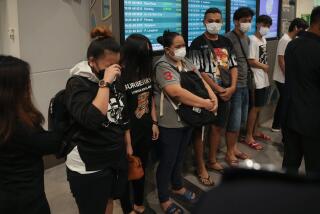Corruption Runs Deep Among Thai Police : Indochina: Graft in the force is longstanding and no secret. Illicit night life and gambling dens are infamous sources of protection money paid monthly to local precincts. Some officers have been charged with kidnaping and even murder.
BANGKOK, Thailand — When Thailand’s national police chief took office last fall, he was blunt with fellow officers: The public regards policemen as cruel and immoral and more likely to break the law than to enforce it.
With frequent headlines alleging police wrongdoing ranging from corruption to kidnaping and murder, they hardly needed the reminder from Gen. Pochana Boonyachinda.
Graft in the force is longstanding and no secret. Rare is the driver who has not been pulled over to pay a 100-baht ($4) on-the-spot “fine” for real or imaginary traffic violations. Illicit night life and gambling dens are notorious sources of protection money paid monthly to local police precincts.
But recently Thais have been shocked by the scale, brazenness, viciousness--and apparent institutionalization--of police crime and corruption.
Long the recipients of protection money and sexual favors from brothels, police officers act as enforcers and even procurers in a business that amounts to a modern-day slave trade.
On the day in 1992 that Prime Minister Chuan Leekpai announced a crackdown on child and forced prostitution, the body of a young prostitute who tried to escape a brothel was found with her throat slashed at the provincial hall of southern Songkhla province. Two policemen were among six suspects charged with her murder.
An investigation found that during her attempt to flee, two other police officers to whom she turned for help tried to persuade her to return to the brothel and work off the “debt” she owed its owners.
Last year, much skepticism was expressed about a police report that said another escaped prostitute somehow managed to poison herself during a police interrogation.
The New York-based organization Human Rights Watch charged a year ago that Thai police are involved in the procurement and trafficking of Burmese girls for Thai brothels.
“Thai border and provincial police control all roads from the Burmese border into Thailand . . . ,” the report said. “It is extremely difficult for Burmese to cross the border and travel any distance without the knowledge and involvement of the Thai police. The brothel agents are well supplied with money to pay them off.”
Police also have been accused of conspiring with Japanese gangsters to send women to Japan to work in the sex trade there.
Meanwhile, seven police officers are on trial in the slayings of 13 businessmen and tourists from Taiwan, Hong Kong and China.
Arrested a year ago, they allegedly preyed on Chinese-looking foreigners, taking them away on the pretext that their travel documents were not in order. The victims were driven to a deserted area outside Bangkok, robbed, beaten and shot. Their corpses were run over or otherwise mutilated in an effort to thwart identification.
The murders were a deadly twist on a common extortion scheme in which officers or their confederates plant drugs on hapless tourists and then put on the squeeze for bribes to avoid charges.
Less violent, but no less spectacular, was a case two years ago, when five senior policemen in the country’s north were accused of keeping half the recovered money from a $2-million robbery. The other half they proudly displayed to journalists in claiming credit for solving the crime.
Five lower-ranking police officers were among the 11 people arrested in connection with the heist itself, which took place across the border in Laos.
In another case, millions of dollars in jewels disappeared from police custody, and many Thais believe the wives of high-ranking police officials and their friends ended up with the gems. The jewelry had been stolen from a palace in Saudi Arabia and recovered by Thai police.
In an added twist, investigators charged that several officials, including former national police chief Prathin Santiprapop, kidnaped the wife and son of a gem dealer in a failed attempt to get information on the missing jewels. A court dismissed the charges against Prathin in November for lack of evidence.
Some experts think public outrage and angry editorials have reached a level that may bring changes.
Purachai Piumsombun, a policeman-turned-academic, says that for the first time in decades, Thais are beginning to grapple with the causes of police corruption, which include poor training and low pay.
Many officers at the station level work almost a 100-hour week at a salary just a bit higher than the minimum wage for laborers, he said.
“I compare most police officers at the police station level to tissue paper,” he said. “After they have been used up, they are thrown into the waste basket.”
More to Read
Sign up for Essential California
The most important California stories and recommendations in your inbox every morning.
You may occasionally receive promotional content from the Los Angeles Times.










